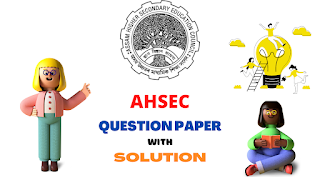AHSEC| CLASS 11| LOGIC AND PHILOSOPHY| SOLVED PAPER - 2022| H.S.1ST YEAR
2022
LOGIC AND PHILOSOPHY
Full Marks: 100
Pass Marks: 30
Time: 3 hours
The figures in the margin indicate full marks for the questions’
1. Answer the following as directed: 1×12=12
(a) Logic is a normative science. (Fill in the blank)
(b) Universal negative proposition is represented by the symbol 'E'. (Fill in the blank)
(c) Give an example of one-predicate general proposition.
Ans:- (a) Everything is mortal, (b) Nothing is permanent. The first proposition is symbolized as (x) (Mx) and the second proposition is symbolized as (x) (||Px).
(d) What is the name of the subject of the conclusion of a syllogism?
Ans:- Syllogism is a form of mediated deductive inference, in which a conclusion is jointly drawn from two premises.
(e) In a categorical syllogism from two particular propositions/universal propositions no conclusion can be drawn. (Choose the correct answer)
Ans:- In a categorical syllogism from universal proposition no conclusion can be drawn.
(f) FERIO is a valid mood of the First/Second/ Third Figure. (Choose the correct answer)
(g) Every logical connective connects only two simple propositions. (Fill in the blank)
(h) What is the derivative meaning of the word 'Philosophy'?
Ans:- Philosophy is the comprehensive study of the entire universe. It inquires into the nature of the universe in which we live, the nature of the human soul and its destiny and the nature of God or the Absolute and their relation to each other.
(i) The founder of Yoga philosophy is patanjali. (Fill in the blank).
(j) "Monads are windowless." Who said this statement?
Ans:- Gottfried Wilhelm Leibniz.
(k) In Indian philosophy, valid knowledge is known as pram_a. (Fill in the blank)
(l) The different types of Idealism are subjective Idealism, objective Idealism and Phenomenalistic Idealism. (Fill in the blank)
2. State two points of difference between traditional logic and symbolic logic. 1+1=2
Ans:- There are two points of difference between traditional and symbolic logic:-
(i) Symbolic logic has a short history but traditional logic has a long history.
(ii) The use of variables in symbolic logic is much wider than in traditional logic.
3. Classify proposition according to quantity. 2
Ans:- According to quantity, propositions are divided into Universal and particular.
A Universal proposition is one in which the predicate is a affirmed or denied of the whole subject. For example - All men are mortal. No men are perfect.
A particular proposition is one in which the predicate is affirmed or denied of a part of the subject. For example - Some men are honest. Some men are not intelligent.
The quantity of categorical proposition is determined by the quantity of the subject.
4. Write two points of difference between sentence and propositoin.1+1=2
Ans:- There are two differences between sentence and proposition:-
(i) Every sentence should be made up of words and have a meaning. But when we talk about a proposition, we are not talking about the sentence, but about the meaning of this sentence.
(ii) Every sentence does not state any proposition. Only sentences, which we use to emphasize something, express propositions.
5. Define conjunctive proposition with example. 2
Ans:- In testing the validity of logical expressions, connective propositions use the word "and". For example, if we want to know whether both propositions grouped together are true, we use the word “and.” This is called connective proposal. For example: "Canada is in North America and New York City is the largest city in Canada."
6. Write two points of difference between Deductive and Inductive Inference. 1+1=2
Ans:- There are two points of difference between deductive and inductive inference:-
(i) In deductive inference we go from general to specific. On the other hand, in inductive inference we move from the particular to the general.
(ii) In deductive inference, the conclusion necessarily follows from the premises. But in inductive inference the conclusion does not necessarily follow from the premises.
7. State two rules of conversion. 1+1=2
Ans:- The rules of change are as follows:-
(i) The subject of association becomes the predicate of inversion.
(ii) The predicate of the secret story becomes the subject of conversation.
8. Write the names of two valid moods of the Second Figure. 1+1=2
Ans:- AEE, EAE.
9. Symbolize the following propositions: 1+1=2
(a) It is false that the grass is not green.
Ans:- ~G
(b) Either I will go to library or attend the seminar.
Ans: p v q
10. Write the names of two Vedic schools. 1+1=2
Ans: (i) Nyaya (ii) Vaisheshika
11. Give two criticism of Innate Ideas. 1+1=2
Ans:- There are two criticisms of intuitive ideas:-
(i) Locke criticizes intuitive ideas. For him, first of all, if there are innate ideas, they must be equally present in all minds. But such thoughts are not in everyone's mind.
(ii) Secondly, if there are spontaneous thoughts in the mind then they should be the same in all the minds. But the so-called innate ideas of God, morality etc. differ in different societies, different countries and different eras.
12. Which of the following statements are true? 1+1=2
(a) (i) "Descartes, Locke, Berkeley and Hume are rationalistic philosopher."
(ii) "Descartes, Spinoza, Leibniz and Wolf are rationalistic philosopher."
Ans:- (i) "Descartes, Locke, Berkeley and Hume are rationalistic philosopher."
(b) (i) "Logic is concerned with mediate knowledge, not with immediate knowledge."
(ii) "Logic is concerned with immediate knowledge, not with mediate knowledge."
Ans:- (i) "Logic is concerned with mediate knowledge, not with immediate knowledge.'
13. State any two points of difference between Realism and Idealism. 1+1=2
(Buy E-Books to read complete solutions)
DOWNLOAD [PAGE LINK:-CLICK HERE]
***
LOGIC AND PHILOSOPHY SOLVED PAPERS PAGE LINK - Click here
BUY E-BOOK (PDF FILE)
[TO SEE FULL SOLUTION]
(Chapter wise Notes, Exam Question Papers solved, MCQ solved) [ARTS, COMMERCE, SCIENCE]
|
DOWNLOAD PAGE LINK:-CLICK HERE |
AHSEC PAGE LINK - CLICK HERE
Also Read:

